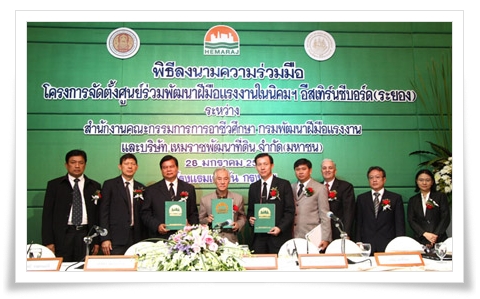最新ニュース
Hemaraj Launches Major Skill Training Initiative in Eastern Seaboard in Partnership with Vocational Education Commission and Department of Skill Development
29/01/2008
BANGKOK - 28 January 2008: Leading industrial estate developer Hemaraj Land And Development Plc, today announced the signing of a memorandum of understanding (MOU) with the Vocational Education Commission and the Department of Skill Development to set up a Skill Training and Development Centre. The facility will be located in Hemaraj’s Eastern Seaboard Industrial Estate (Rayong), one of the most integrated automotive industrial clusters in the world.
Renowned as "Detroit of the East", Eastern Seaboard Industrial Estate (Rayong) is Thailand's hub for car and car parts manufacturing. It is home to over 200 automotive supply-line companies and other export-oriented industries. The size of the combined investment by local and multinational corporations in the industrial estate totals some Bt140 billion to date.
The establishment of the skill training and development centre is part of Hemaraj's efforts to support the country's strategic industrial development by boosting skills and knowledge of those already in employment and those about to enter the manufacturing sector. One of the centre's objectives is to ensure that the workforce has the skills to match the needs of the industry. This will facilitate future investment growth both locally and from overseas.
"Skilled labour force is a crucial factor in attracting foreign investment. Our workers have to possess the qualifications that industries require, thus skill training and development have to completely match those requirements," said Hemaraj's chairman Mr. Sawasdi Horrungruang.
According to Mr. Sawasdi, Hemaraj had conducted a survey to find out the needs of its customers in Eastern Seaboard, which is the hub for automotive sector – the country’s important strategic industry. With the full support from the Vocational Education Commission and the Department of Skill Development, the Skill Training and Development Center will be opened in June 2008. During the initial stage, the workshop will be housed in ESIE Plaza 1 Building within the sprawling Eastern Seaboard Industrial Estate (Rayong).
"We intend to develop the centre into a comprehensive industrial training facility with a range of activities and courses that appeal to a large and growing number of participants," Mr. Sawasdi added.
It is plausible to establish a skill training center within an industrial estate for a number of reasons. Firstly, by bringing in trainers, it is not only convenient, but also saves time and expenses for a large number of course attendees. Secondly, the close proximity of the training center to the manufacturing base will provide a seamless linkage between educational authorities and potential employers in the private sector. It is likely to lead to closer cooperation, frequent exchanges and increased flexibility in terms of curriculum design and course content. Training and skill development will be more effective and responsive to the real needs and will help take away burdens from individual employers to provide extensive training for new recruits. In addition, those with only a vocational diploma will be encouraged to seek employment immediately after graduation because they have an opportunity now to further their studies without having to give up work since the "school" will be close to their workplace. On the whole, this will effectively enlarge the labour pool. It's a win-win situation because these young people will also gain financial independence and be able to support their families while pursuing a higher degree.
Courses on offer will be divided into those that require lectures and those that are more hands-on. Lectures for subjects like logistics, design and general introduction classes will be held in Hemaraj's own training centre and can start immediately. Practical work courses will commence in June when the construction of a new workshop is completed. Courses in basic technical skills, welding, metal work techniques, PLC, service and maintenance as well as custom-made courses for each factory will be on offer.
In a bid to promote excellence in vocational skills through collaborative work with the private sector, the Vocational Education Commission and the Department of Skill Development have been instrumental in this project, and their work has complemented each other. While the Vocational Education Commission focuses on vocational training in degree-conferring institutes, the Department of Skill Development is tasked with skill development of the labour force.
Mr. Veerasak Wongsombut, Secretary-General of the Vocational Education Commission said, “Our office is responsible for certifying the qualifications of two groups of people, namely, factory workers with basic formal education and vocational students in the school system. For the first group, years of experience may count toward academic credits. If they take a few extra courses and sit for a qualification exam, they will gain a vocational diploma or a higher vocational diploma. On the other hand, some vocational students may opt to spend more time on apprenticeships than attending lectures. In such cases, they may choose to take classes on academic subjects at a joint skill development centre such as this one. They will then be qualified to pursue a higher vocational degree if they wish.”
Mr. Somkiat Chayasriwong, Director-General of the Department of Skill Development, expressed confidence that the joint Skill Training and Development centre will boost key competencies of workers in the automotive industry. "I am extremely pleased with our cooperation. The Department of Skill Development, the Vocational Education Commission and Hemaraj will work together to ensure that this skill training centre is a success. With the support of Hemaraj, the centre is centrally and conveniently located in Eastern Seaboard. It will develop workers with high standards to meet the requirements of locally-based industries. The Department of Skill Development is responsible for developing courses for both newcomers and those already in employment, identifying training needs and course design, and supervising the national skill standard certification program.
Referring to today's signing of the MOU as "an excellent start", Mr. Sawasdi of Hemaraj Land and Development said the cooperation between the three agencies could not have been accomplished without a shared vision, a common goal, and a firm commitment to work for the progress of the nation.
“I would like to express my appreciation to the Department of Skill Development and the Vocational Education Commission for being extremely open to comments and suggestions from the private sector. Our achievement today is the result of a long
collaborative process. I truly believe that the skill training centre will stand out as a fine example of what we can achieve when the public and the private sector work together," Mr. Sawasdi concluded.
In the picture: Mr. Veerasak Wongsombat (3rd from left), Secretary General of the Office of Vocational Education Commission, Ministry of Education, Mr. Sawasdi Horrungruang (4th from left), Chairman of the Board, Hemaraj Land And Development Plc., and Mr. Somkiat Chayasriwong (Center), Director-General of the Department of Skill Development posted for picture after signing the memorandum of understanding.

